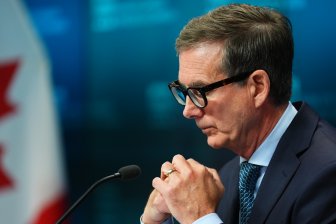Members of the Métis Nation of Alberta (MNA) voted overwhelmingly in favor of ratifying a constitution in a month-long voting process, as announced at a gala on Thursday.
In the largest ratification vote of an indigenous group in Canadian history, 15,729 people voted in November. Almost 97 percent voted in favor of the constitution.
Read more:
Constitution vote would allow Alberta Métis to govern themselves; opponents feel under-consulted
Read more
-
![]()
Constitution vote would allow Alberta Métis to govern themselves; opponents feel under-consulted
The agreement establishes the MNA as a legitimate government in Canada. It is one of about 25 self-government agreements already in place – a modern treaty.
This allows the MNA to start running things in a way that works best for them, according to Garrett Tomlinson, senior director of self-government implementation at MNA.
“What self-government will allow the MNA to do is collect transfer payments from the Government of Canada and develop their own health programming, health delivery, their own child and family services programs and deliver them directly to our citizens in ways that pay meaningful attention to their needs,” he said.
Read more:
Whitecap Dakota Nation votes to become the first self-governing indigenous nation in Saskatchewan
“The sky is the limit for what it can look like.
“You can see Métis primary care clinics, Métis service delivery models through dental care, mental health programming specific to Métis needs, funded and regulated by the MNA.”

During the vote, Ron Quintal, president of Fort McKay Métis Nation near Fort McMurray, told 630 CHED that this vote was an undemocratic power grab.
Now that the constitution has been ratified, he said it still doesn’t mean the MNA is the only representative of Métis people in Alberta.
“I want to be here very clearly … in any way for (MNA members) to be able to claim rights, I welcome that. However, the reality from my perspective is that this is rather a conversation that we need to have with Justin Trudeau and (Crown-Indigenous Relations) Minister (Marc) Miller for clarity,” he said.
“I think that the question on everyone’s mind is, ‘Is this really valid? Does this organization really represent my rights?’ And Canada needs to make that very clear.”

Quintal recommends that the constitution be applied only to MNA members.
“If the government would come in and say the legislation for the MNA constitution would be limited to their membership, then I think the problem would be averted,” he said.
Read more:
Why Indigenous-led projects could be the key to combating Canada’s energy dilemma
MNA President Audrey Poitras addressed those who oppose the constitution while speaking to MNA members on Thursday.
“There are some who do not share this vision. They don’t want to see a unified Métis nation,” Poitras said.
“Rather, they see themselves as working more like Indian Act groups on reservations. But there is a reason why our ancestors took a stand against that colonial structure and control.”

“No one, whether it be forces from outside our country or the personal ambitions of some within, will ever stand in the way of citizens accessing their government and its services,” she said.
Read more:
Treaty 6, Métis Nation of Alberta welcomes Pope Francis’ visit as part of reconciliation
© 2022 Global News, a division of Corus Entertainment Inc.






